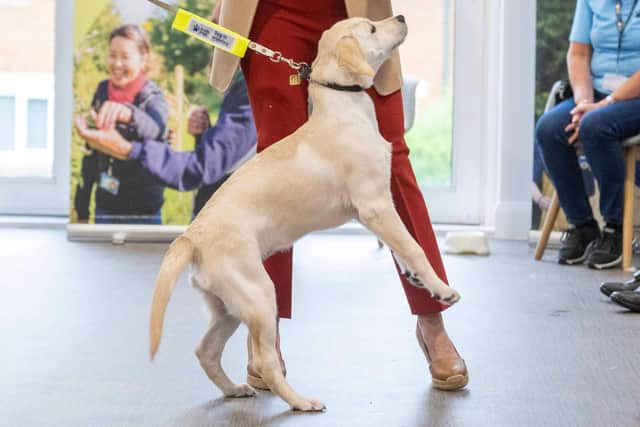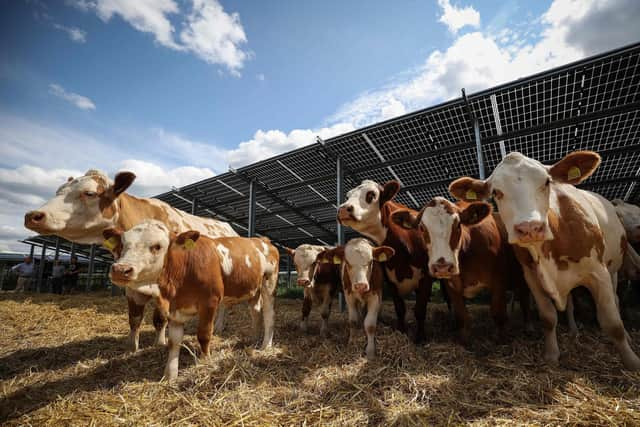Windsor Framework: EU still poised to block 51% of animal medicines from Northern Ireland in 2026, warns British Veterinary Association
and live on Freeview channel 276
The BVA has warned that despite reforms to GB-NI trade outlined in the Windsor Framework (WF), the difficulty remains unresolved and still poses a potentially serious risk to public health, food supplies, animal welfare and trade. The government has told the News Letter that it is working on a solution.
The news comes after the NI Protocol sub-committee of the House of Lords published the results of its inquiry into the impact of the UK-EU deal this week. The report stated that while the WF had reduced some red-tape on trade compared to the Protocol, serious problems remain.
Advertisement
Hide AdAdvertisement
Hide AdIn their report, the peers expressed concern that a permanent solution to the movement of veterinary medicines from Great Britain to NI had not been achieved. Those medicines only continue to flow freely into NI from GB due to a grace period on EU import restrictions that is set to run out at the end of 2025.


The committee noted the warnings it had received from industry representatives that, without a permanent solution, the supply of more than 50 per cent of veterinary medicines to Northern Ireland may be discontinued, posing a risk both to animal and human health, and to agri-food supply chains.
Responding to the report, the BVA told the News Letter that when the current three year grace period on import restrictions granted by the EU expires in 2025, all the same significant public health risks to NI the BVA warned about in December would arise once again.
NI Branch President Esther Skelly-Smith told the News Letter: “Continued access to veterinary medicines in Northern Ireland remains a serious concern. The UK Government must prioritise finding a permanent workable solution now and not allow the issue to slide towards another cliff edge in two and a half years’ time.
Advertisement
Hide AdAdvertisement
Hide Ad"Secure access to medicines is vital and we must not lose sight of the significant implications a loss of almost 51 percent of medicines poses, not just to animal health and welfare but also trade, public health and agriculture.”


In November the BVA warned that EU import restrictions due to activate this year would block 51% of veterinary medicines and have potentially serious impacts on NI. The EU granted a three year grace period but the BVA says exactly the same issues it warned about last year will arise again in 2025 without a resolution.
"The mood is, we're very concerned," Dr Skelly Smith said in November. "This will affect all sectors – farm, equine and pets – and will have significant implications on animal health and welfare, public health, trade and the agricultural economy. Medicines affected include anaesthetics and vaccines, including salmonella vaccine for poultry, the loss of which poses a significant public health issue.”
It will also impact pets and the equine industry. “Our choice of veterinary medicines will be limited. So we may have welfare issues for your dog and cat if we can't use the veterinary medicine we would want to. That has a big implication for welfare."
Advertisement
Hide AdAdvertisement
Hide AdLonger term, the scale and costs of implementing EU medicines requirements means companies are likely to withdraw products from NI, she said. The lack of salmonella vaccines for poultry could also mean that NI products may be barred from certain markets, for example the EU.
The BVA noted that the import difficulties were caused by Brexit – but have not been resolved by the WF.
A Foreign Office spokeswoman said: "Under the old Protocol over half of existing UK veterinary medicine product lines supplying Northern Ireland could have been at risk at the end of 2022, which would have had serious consequences for human and animal health in Northern Ireland,” she said.
The cliff edge was removed with a three year extension from the EU, she added.
Advertisement
Hide AdAdvertisement
Hide Ad" This was important to solve the immediate problem, but the BVA are right to emphasise the need for a long-term solution which protects the supply of veterinary medicines into NI. This is what we are now working on.”